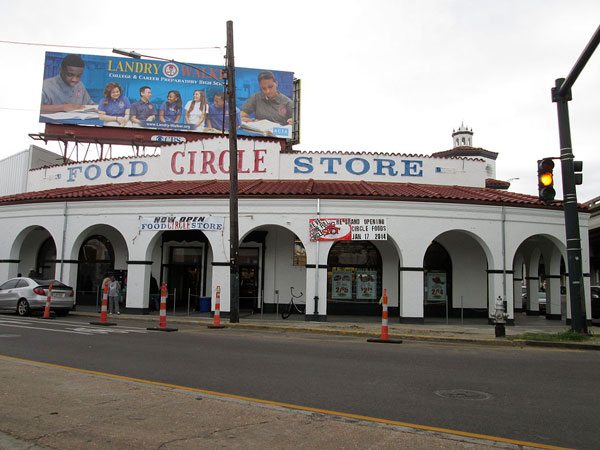
January 8, 2018; Civil Eats
Circle Food market owner Dwayne Boudreaux offers a grocery that’s “clean and stocked with locally sourced produce that arrives with days to spare” in the seventh ward of New Orleans, reports Tom Perkins for Civil Eats. This fact may seem unremarkable until one realizes, as Perkins relates, that “fewer than 10 Black-owned supermarkets remain across the entire country.”
The tale behind Circle Food Store reveals some of the challenges that keep the number of Black-owned grocery stores so low. A Tulane University study notes that Circle Food, which opened in 1938, was “the first [Black] owned and operated grocery store in New Orleans. Circle Food Store is named after the traffic circle that used to exist at the intersection of Claiborne Avenue and St. Bernard Avenue.” Boudreaux took over the store in 1991 and operated it until 2005, when Hurricane Katrina destroyed the business. Even though Boudreaux had a track record of running a grocery store for 14 years, it still took eight long years for the store to reopen.
Getting the store open required raising $8 million, according to Katherine Sayre of the Times Picayune. Overall financing included a “$1 million loan…from the Fresh Food Retailer Initiative, […] a $1.7 million loan from First NBC Bank, $1 million through the Louisiana Office of Community Development, $2.2 million in new market tax credit equity, $2.2 million in historic tax credit equity and $100,000 from the city through an economic development grant.” Hope Enterprise, a regional nonprofit community development financial institution (CDFI), put together the financing and operates a small credit union within the store.
The 22,000-square-foot-store, which is run as a family-owned, for-profit business, employs an estimated 65 workers. Where it can, it seeks to promote community wellness, even at a cost to its bottom line. For example, Perkins notes that because of the high incidence of diabetes and hypertension among Blacks, who constitute an estimated 87.4 percent of Seventh Ward residents, Circle Food has chosen to offer “$5 worth of free, fresh produce to those who spend $5 on it,” meaning that, with the store’s $5 match, a customer who spends $5 on produce can take $10 worth of produce home.
“You should serve the community, because it’s not all about making money,” says Boudreaux. “I’d sell more liquor, alcohol, cigarettes, and fried foods if I wanted to make more money.” Perkins notes that Boudreaux is in his early 40s and “lives seven minutes from the store he has worked at nearly his whole life, before taking it over from his father.”
Sign up for our free newsletters
Subscribe to NPQ's newsletters to have our top stories delivered directly to your inbox.
By signing up, you agree to our privacy policy and terms of use, and to receive messages from NPQ and our partners.
The lack of grocery stores in communities is a major problem—and not solely because of the implications for healthy food access, important though those are. Grocery stores, notes Perkins, often anchor “neighborhood economies, recirculating local revenues through wages and nearby businesses. They can also be neighborhood hubs, where people go to buy good food as well as employment centers and sources of community pride.”
Alas, the lack of these hubs can be damaging, notes Malik Yakini, who directs the Detroit Black Community Food Security Network. Yakini is one of a host of activists across the country who are working to foster community ownership of food businesses in communities of color.
“We’re not a place to dump cheap goods,” Yakini emphasizes, adding that Black communities “need to be producers of goods and stand eyeball to eyeball and shoulder to shoulder to other economic groups.” Detroit, a city that’s 79 percent Black, has no Black-owned grocery stores. According to Perkins, “Yakini and the Food Security Network are planning a grocery cooperative for the city’s North End neighborhood.”
Perkins profiles other examples across the country. For instance, in Minneapolis, the member-owned Seward Co-op in 2016 opened a second store in the Bryant neighborhood, which is 66 percent people of color, and “went to great lengths to let the neighborhood’s residents shape the new market.” In northeast Greensboro, North Carolina, the Renaissance Community Cooperative opened in 2016, serving a largely Black neighborhood that had lacked a grocery store for 18 years. To build the 11,000-square foot, $3 million store, Perkins notes that 1,300 neighborhood-based owners “chipped in at least $100 each.”
As with the financing of Circle Foods in New Orleans, raising funds in Greensboro required a slew of supporters. In Renaissance’s case, this included the backing of three CDFIs: North Carolina-based Self-Help (which bought the land), Shared Capital Cooperative of Minneapolis, and The Working World of New York City.
Ed Whitfield, co-managing director of the Fund for Democratic Communities, a Greensboro-based foundation that helped to organize Renaissance, notes that, “Unfortunately, we live in a society that says it’s legitimate just to maximize profit at any cost, and that generates a whole set of problems. This is a place that meets a community need and has good jobs, and when there’s a profit, the board can decide how to put it back into the community.”—Steve Dubb













